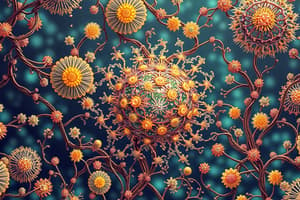Podcast
Questions and Answers
Why are cells small?
Why are cells small?
Because they can absorb nutrients much more efficiently.
Is the rate at which diffusion occurs the same for all substances?
Is the rate at which diffusion occurs the same for all substances?
True (A)
What happens when a cell doubles in size?
What happens when a cell doubles in size?
The volume increases much more than the surface area.
What is diffusion?
What is diffusion?
Flashcards are hidden until you start studying
Study Notes
Cell Size and Efficiency
- Cells are small to enhance nutrient absorption efficiency.
- Smaller cells can quickly absorb sufficient food relative to their volume.
- Larger cells struggle to receive adequate nutrients due to their increased volume compared to surface area.
Diffusion Rate
- Diffusion occurs at a consistent rate of 1 mm in approximately 2 minutes.
- This rate is crucial for understanding how substances move across cell membranes.
Impact of Cell Size on Surface Area and Volume
- When a cell doubles in size, its volume increases significantly more than its surface area.
- The disproportionate growth of volume versus surface area limits nutrient absorption capabilities in larger cells.
Diffusion Process
- Defined as the movement of molecules from an area of higher concentration to one of lower concentration.
- Diffusion does not require any energy input, making it a passive transport process.
Studying That Suits You
Use AI to generate personalized quizzes and flashcards to suit your learning preferences.




